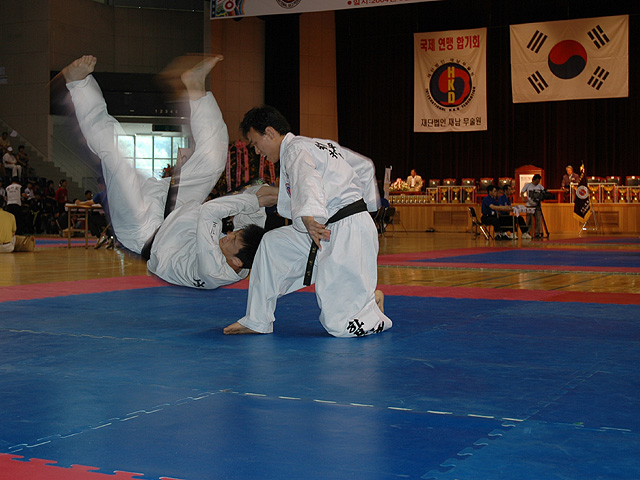- International H.K.D Games
Infobox Korean name
tablewidth=330
caption=Competitors at the 6th International H.K.D Games.
hangul=국제합기도대회
국제 H.K.D 무술대회
hanja=國際合氣道大會
國際H.K.D武術大會
mr=Kuk Che Hap Ki Do Dae Hoi
Kuk Che H.K.D Mu Sul Dae Hoi
rr=Guk Je Hap Gi Do Dae Hwe
Guk Je H.K.D Mu Sul Dae HweThe International H.K.D Games are an event organized by theInternational H.K.D Federation inSouth-Korea to promote the martial arts ofhapkido ,hankido andhankumdo . The name of the event as been changed a few times since the first edition in 1990. Internationally the event is however known as the "International HKD Games". The games were the idea of masterMyung Jae Nam , who was also the founder of the I.H.F.Goal
The goal of the games is to bring hapkido practitioners, mainly those who are a member of the IHF, together in an atmosphere of friendship and mutual love for the HKD-arts and thus promote the IHF-styles of hankido, hapkido and hankumdo. This international event is a place where IHF members from all over the world gather to train together and discus their arts. Usually in the days before and after the event special seminars take place at the IHF headquarters to educate the international members.
History
The first games
On April 1st 1990 the games were first held at the Jang Chung Stadium in
Seoul . These games were mainly used to draw attention the newly founded art of hankido. The games did get some media attention and the Korean Broadcasting System(KBS) showed a reportage of the games on tv. These first games weren't exactly an international event. Only Brazil had joined the games with a full team. A registration of the event was later put on video.The second games
on August 12 and 13. This time a lot more international teams had joined.
The third games
In 1997, on August 16 and 17, the games were held for the first time at the I.H.F headquarters near the city of
Yongin . During the opening festivities a newly developed sword art, called hankumdo, was demonstrated to the public. It was also from these games on that hankumdo was one of the competitions players could participate in.The third games saw a name change to "International H.K.D Martial Arts Competition" (국제 H.K.D 무술대회), placing more emphasis on the fact that there were multiple martial arts being competed in. These games were the last games Myung Jae Nam attended himself, he died in 1999.
The I.H.F made a video available of these games as well.
The fourth games
After Myung Jae Nam's death in 1999 the fourth edition of the games the summer of 2000 were used to commemorate him. Ceremonies were held near Myung Jae Nam's tomb which is located at the I.H.F headquarters compound where the games took place. The games lasted two days, namely August 12th and 13th.
The fifth games
The fifth games were held on August 10th and 11th of 2002 in the city of
Seongnam . The games saw a very strong international players field. During the opening ceremony it became clear that the I.H.F was heading in a new technical direction.Later a video with a registration of the event was made available.The sixth games
On August 15th 2004 hapkido practitioners gathered at the stadium in Yongin to join the sixth edition of the games. The games only lasted one day this time and only a few international delegations had joined, most notably the teams from Chile and the Netherlands. Other international competitors joined on personal title.
The seventh games
On July 22nd of 2007 the games again took place in the city of Yong-In. People from fifteen different nations joined the games. A total of around 1500 people attended these games. It was also during the preparation for these games that the IHF started training international referees.
The eighth games
At the seventh edition of the games the IHF announced that the next games will take place in 2010. It will be the first time the international games will take place outside South-Korea in the United States of America. The 2010 competition will be held in
Battle Creek ,Michigan .Competitions
Competitors joining the game can compete in several different disciplines, both individually and as a team. Which disciplines are available can differ from event to event. Here a few examples of disciplines that took place during previous games:
*Hapkido team and duo demonstrations
*Hankido team and duo demonstrations
*Hankumdo team and duo demonstrations
*Falling, individual, distance jump
*Falling, individual, heigh jump
*Falling, individual, technical
*Kicking techniques, individual, technical
*Sparring, individualKorean schools compete each other in the team demonstrations. The winning Korean teams enters the international pool where they have to compete against the international teams.
National Games
References
*Program issued at the 2nd H.K.D games
*Program issued at the 4th H.K.D games
*Program issued at the 6th H.K.D games
Wikimedia Foundation. 2010.
